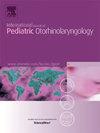The use of tranexamic acid in paediatric adenotonsillectomy – A systematic review and meta-analysis
IF 1.2
4区 医学
Q3 OTORHINOLARYNGOLOGY
International journal of pediatric otorhinolaryngology
Pub Date : 2024-09-13
DOI:10.1016/j.ijporl.2024.112110
引用次数: 0
Abstract
Background
Tonsillectomy and adenoidectomy (AT) are two of the most commonly performed ENT procedures in children, with over 500,000 cases performed annually in the United States. Whilst generally considered a safe and well-tolerated operation, it is not without its risks and complications including pain, nausea, anorexia and most importantly bleeding and post-tonsillectomy haemorrhage (PTH). Whilst tranexamic acid (TXA) has a proven benefit in reducing bleeding and transfusion requirements in patients undergoing trauma, spinal and cardiac surgery; the effectiveness, timing and safety of its application in paediatric tonsillectomy has not yet been established.
Aims, objectives & significance
To date, there has been no published systematic review of the literature specifically looking at paediatric patients undergoing AT, despite a massive surge in popularity of the use of TXA perioperatively. The aim of this study is therefore to systematically review the current literature and collate evidence regarding the efficacy and safety of using TXA to reduce bleeding in children undergoing tonsillectomy and/or adenoidectomy.
Methods
A structured search of bibliographic databases (MEDLINE, EMBASE, PubMed, CINAHL, Cochrane CENTRAL) was undertaken to retrieve randomised controlled trials, non-randomised case-control studies and ongoing clinical trials that describe the use of TXA in paediatric patients undergoing AT. The following search terms (and their variations) were used as both medical subject headings (MeSH terms) and text words: tranexamic acid, bleeding, tonsillectomy, adenoidectomy, paediatrics. To ensure that all relevant data was captured, the search did not contain any restrictions on language or publication time. Data extraction and risk of bias assessment was performed independently and in duplicate.
Results
This review identified and included a total of eight studies (n = 1315). Five studies reported on the intravenous use of TXA (n = 531) whilst three studies reported on the topical use of TXA (n = 784), and these were analysed separately. The intravenous use of TXA did not reduce intraoperative blood loss significantly (95 % CI: −0.1 to 0.33 p = 0.28) and there was not enough information to analyse the effect on PTH in these studies. Topical TXA led to a significant reduction in both intraoperative blood loss (95 % CI 0.11 to 5.31, p = 0.04) and post operative bleeding rates (RR 0.04, 95 % CI 0.01 to 0.08, P = 0.02).
Conclusion
The results of this systematic review and meta-analysis suggest that TXA administered via the intravenous route does not reduce perioperative bleeding associated with AT in paediatric patients. However, when topical TXA is used intraoperatively at the surgical site in paediatric patients undergoing adenoidectomy alone, there was a significant reduction in both intraoperative blood loss and post operative bleeding. TXA appears to be a safe and well-tolerated drug in the paediatric population with no adverse effects reported in this review. Nevertheless, further large and well-designed randomised controlled trials are needed to investigate the risks and benefits of TXA in paediatric AT with a particular focus on its use topically and in association with newly developed surgical equipment.
在小儿腺样体切除术中使用氨甲环酸--系统回顾和荟萃分析
背景扁桃体切除术和腺样体切除术(AT)是儿童耳鼻喉科最常见的两种手术,美国每年进行的手术超过 50 万例。虽然人们普遍认为这是一种安全、耐受性良好的手术,但它也并非没有风险和并发症,包括疼痛、恶心、厌食,最重要的是出血和扁桃体切除术后出血(PTH)。尽管氨甲环酸(TXA)在减少创伤、脊柱和心脏手术患者的出血和输血需求方面具有公认的优势,但其在小儿扁桃体切除术中应用的有效性、时机和安全性尚未确定。因此,本研究旨在系统回顾现有文献,整理有关使用 TXA 减少接受扁桃体切除术和/或腺样体切除术的儿童出血的有效性和安全性的证据。方法对文献数据库(MEDLINE、EMBASE、PubMed、CINAHL、Cochrane CENTRAL)进行结构化检索,以检索描述在接受扁桃体切除术的儿科患者中使用 TXA 的随机对照试验、非随机病例对照研究和正在进行的临床试验。以下检索词(及其变体)被用作医学主题词(MeSH 词)和文本词:氨甲环酸、出血、扁桃体切除术、腺样体切除术、儿科。为确保获取所有相关数据,搜索不包含任何语言或出版时间限制。数据提取和偏倚风险评估均独立进行,一式两份。结果本综述共发现并纳入了 8 项研究(n = 1315)。其中五项研究报告了TXA的静脉注射使用情况(n = 531),三项研究报告了TXA的局部使用情况(n = 784),这些研究分别进行了分析。静脉使用 TXA 并未显著减少术中失血量(95 % CI:-0.1 至 0.33 p = 0.28),而且这些研究中没有足够的信息来分析对 PTH 的影响。局部 TXA 可显著降低术中失血量(95 % CI 0.11 至 5.31,P = 0.04)和术后出血率(RR 0.04,95 % CI 0.01 至 0.08,P = 0.02)。然而,如果在单独进行腺样体切除术的儿科患者术中在手术部位使用局部 TXA,则可显著减少术中失血和术后出血。在儿科人群中,TXA 似乎是一种安全且耐受性良好的药物,本综述未报告任何不良反应。尽管如此,仍需进一步开展大规模、设计良好的随机对照试验,以研究 TXA 在小儿扁桃体切除术中的风险和益处,尤其要关注其局部使用情况以及与新开发的手术设备的结合情况。
本文章由计算机程序翻译,如有差异,请以英文原文为准。
求助全文
约1分钟内获得全文
求助全文
来源期刊
CiteScore
3.20
自引率
6.70%
发文量
276
审稿时长
62 days
期刊介绍:
The purpose of the International Journal of Pediatric Otorhinolaryngology is to concentrate and disseminate information concerning prevention, cure and care of otorhinolaryngological disorders in infants and children due to developmental, degenerative, infectious, neoplastic, traumatic, social, psychiatric and economic causes. The Journal provides a medium for clinical and basic contributions in all of the areas of pediatric otorhinolaryngology. This includes medical and surgical otology, bronchoesophagology, laryngology, rhinology, diseases of the head and neck, and disorders of communication, including voice, speech and language disorders.

 求助内容:
求助内容: 应助结果提醒方式:
应助结果提醒方式:


